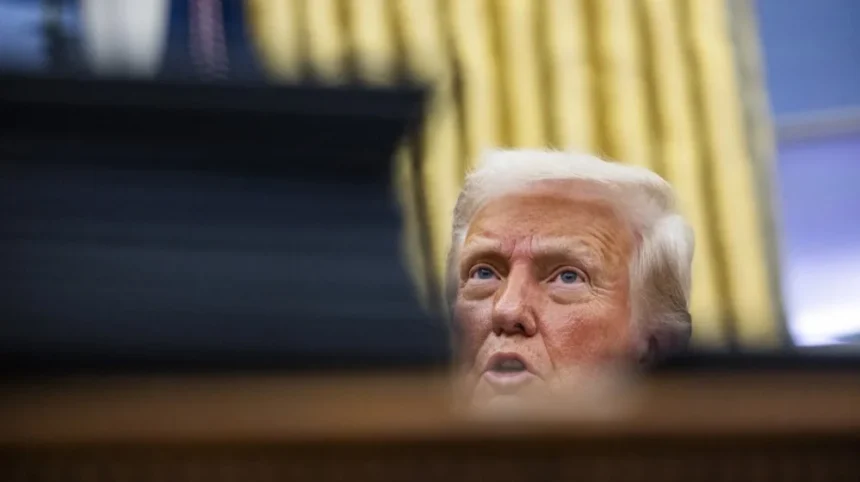One of the ways Donald Trump’s administration obscures and diverts attention is by constantly focusing on the U.S.—its raw power to intimidate and bully other nations, as well as its vast financial influence through organizations like USAID.
At the same time that Trump projects his agenda on the global stage, he is withdrawing the U.S. from the world, reducing its role to an imperial force that openly picks its engagements based on alliances and interests, writes Nesrine Malik, a columnist for The Guardian.
U.S. taxpayer money is highly valuable on one hand, yet on the other, it is spent on proposals such as taking over the entire Gaza territory and sending billions in aid to Israel. This is not isolationism—it is unilateralism.
The U.S. Retreat from Global Leadership
Despite dominating global news, the U.S. has been retreating as a moral, military, and economic power, shifting toward selective engagement.
This retreat follows a broad trajectory. The early 1990s, after the Cold War ended, were marked by the so-called “end of history,” where liberal capitalist values were expected to dominate through globalization and free trade, while democracy flourished as the Soviet Union and Eastern European autocracies collapsed.
However, in the three decades since, the U.S. has expanded and then retracted. It began this era with multiple military interventions and campaigns across the Middle East and South Asia, under the guise of establishing security and democratic rights, as well as enforcing broad sanctions on adversaries.
Yet it ended this period with a sudden withdrawal from Afghanistan, without achieving its objectives, reducing troop numbers in Iraq, and leaving numerous embassies around the world vacant.
On October 7, 2023, the U.S. had no ambassadors in Israel, Egypt, or Lebanon. The primary reason was the Iraq war, which consumed much of Washington’s foreign policy focus.
The Rise of Alternative Global Powers
Meanwhile, the world has simply changed. America’s superpower status depended on maintaining a status quo in which no other nation could accumulate enough economic and strategic influence to create its own unilateralism or a version of multipolarity that undermines the U.S.
A brief look at the data reveals that China is now Africa’s largest trade partner and creditor. Twenty percent of Africa’s exports go to China, while 16 percent of its imports come from China.
Chinese foreign direct investment is deeply embedded in Africa’s development, particularly in transportation, mining, energy, and infrastructure. China has driven a broader shift—South-South trade is increasing, while North-North trade is declining, especially since the global financial crisis, creating a more integrated and interdependent world south of the equator and east of the Atlantic.
The Middle East’s Strategic Realignment
Powerful Middle Eastern nations are using their wealth to become global players sitting atop capital investment structures.
Trump has courted Saudi Arabia, even stating after his inauguration that Riyadh would be his first foreign visit if the kingdom fulfilled its promise to purchase half a trillion dollars’ worth of American goods.
Meanwhile, Qatar is investing billions in the U.S., and the UAE’s sovereign wealth fund has designated the U.S. as a primary investment destination.
These states are also expanding regionally, establishing ties with Turkey to gain strategic autonomy from the West and hedge against shifts in U.S. policy toward Turkey and the Gulf, while the global economy’s center of gravity shifts toward the Indo-Pacific.
This translates into real political power.
Challenges to U.S. Global Influence
This shifting center of gravity and the more secure distribution of political and economic power are having a domino effect on the remaining U.S. foreign policy agenda.
Russia’s ability to circumvent sanctions has been partially enabled by trade through China, the UAE, and Turkey—countries now too powerful and integrated into the global economy to be effectively subjected to secondary sanctions.
Similarly, the Biden administration’s recent genocide declaration regarding Sudan and the sanctions imposed on warring factions are unlikely to significantly curtail the role of arms suppliers, from Iran to the UAE. These actors either fall outside U.S. influence or are too powerful to be disciplined.
The main culprit behind the U.S.’s declining ability to exert pressure and persuade is globalization itself—the very force that was supposed to position the U.S. as the CEO of Globe Inc., expanding its economic and political ethos.
Free capital movement, lower trade barriers, deregulated cheap labor, and diversified national revenue sources have shaped a world that can no longer be divided into isolated “axes of evil” and compliant regimes.
The international community is now split between those with economic weight and global trade alliances and those without either, yet who now have more options to become client states outside the U.S. sphere of influence.
A New Global Order Emerges
With Trump in power, a retreat from his administration’s unstable and unreliable policies and a shift toward more stable alliances would be a wise move for any government capable of hedging its bets.
Trump moves too fast, breaks too many things, and triggers reactionary forces that make the next four years seem less like a period where the Democratic Party can recover and succeed again, and more like an era in which Trumpism will continue in different forms.
As a result, Trump is leading the U.S., turbulent and destabilized, into a world where its ability to advance any agenda is increasingly undermined by its own moral and political decline, as well as the rise of other nations and alliances reshaping the global order.
This is the end of the end of history. A new chapter begins—one that is purely transactional, more crowded, and where political power is far more dispersed.
Trump’s simultaneous retreat in some areas and aggressive assertion in others could create both a vacuum and provocation that accelerates this process. The irony is that while Trump casts a large, dark shadow, more and more of the world is stepping out from under the U.S.’s influence.







